On page SEO services 📈 are essential for enhancing your website’s visibility and search engine rankings. By focusing on optimizing individual elements of your web pages, you can attract more organic traffic and improve user experience.
In this blog post, we’ll explore the critical aspects of on page SEO 🔍, provide a detailed 15-point formula for effective optimization, and share strategies to boost your SEO performance. Dive in to learn how you can elevate your website’s search engine presence with expert on page SEO services.
Table of Contents
Understanding On Page SEO
On page SEO, also known as on-site SEO, is the practice of optimizing individual web pages to rank higher and earn more relevant traffic in search engines. It involves making changes to the content and HTML source code of a page to improve its visibility and relevance to search engine algorithms.
On page SEO services focus on various elements such as keyword usage, meta descriptions, title tags, internal linking, and image optimization. By optimizing these elements, you can significantly enhance your website’s search engine ranking, user experience, and overall performance.
What is On Page SEO?
On page SEO refers to all the measures that can be taken directly within your website to improve its position in the search rankings. Unlike off-page SEO, which involves external signals like backlinks, on page SEO is all about optimizing the content and structure of your site itself.
Importance of On Page SEO
The importance of on page SEO cannot be overstated. Effective on page SEO helps search engines understand your website and its content, as well as identify its relevance to user queries. This is crucial because search engines are constantly striving to provide users with the most relevant and high-quality results for their searches.
Key benefits of on page SEO include:
- Improved Search Engine Rankings: Proper optimization can lead to higher rankings on search engine results pages (SERPs).
- Better User Experience: Optimizing elements like page speed, content, and navigation enhances the user experience, leading to longer visit durations and lower bounce rates.
- Increased Organic Traffic: Higher rankings and better user experience naturally lead to more organic traffic to your website.
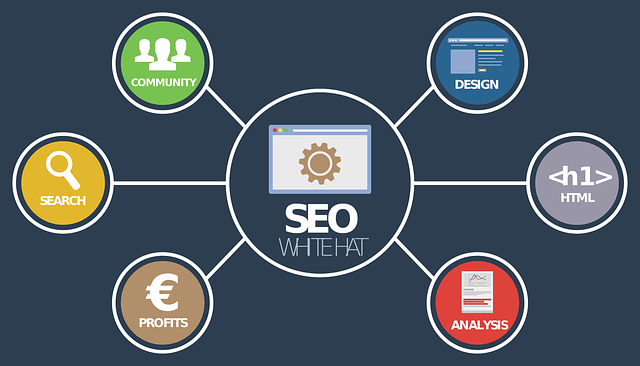
Essential Elements of On Page SEO
Several key elements contribute to effective on page SEO:
- Keyword Optimization: Using the focus keyword “on page seo services” strategically throughout your content, especially in titles, headings, and the first paragraph. Also, incorporate secondary keywords like “on page seo service” and “website optimization services.”
- Title Tags and Meta Descriptions: Crafting compelling and keyword-rich title tags and meta descriptions that accurately describe the content of the page.
- Content Quality: Ensuring your content is high-quality, informative, and relevant to your target audience. Use shorter sentences and paragraphs for better readability.
- Internal Linking: Linking to other relevant pages within your website to enhance navigation and distribute page authority.
- Image Optimization: Using SEO optimized images with proper file names, sizes, and alt text to improve page load times and accessibility.
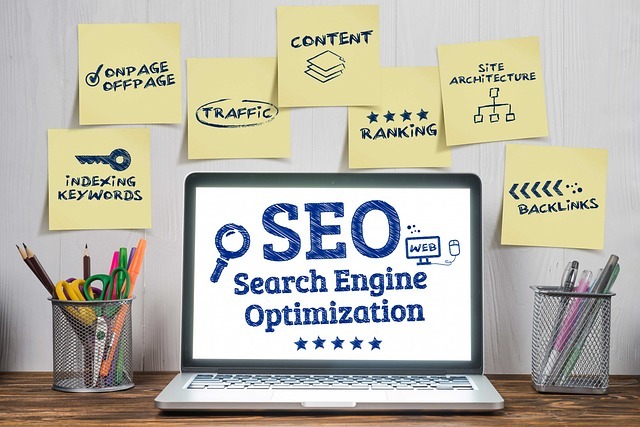
By understanding and implementing these on page SEO techniques, you can enhance your website’s performance and visibility in search engine results, leading to greater online success.
15 Points Formula for Effective On Page SEO
Mastering on-page SEO services is crucial for improving your website’s visibility and ranking on search engines. Here’s a comprehensive 15-point formula that can guide you in optimizing your web pages effectively:
1. Focus Keyword
The cornerstone of on page SEO services is the focus keyword. Ensure the primary keyword, “on page seo services,” is included naturally in your content. This helps search engines understand the main topic of your page.
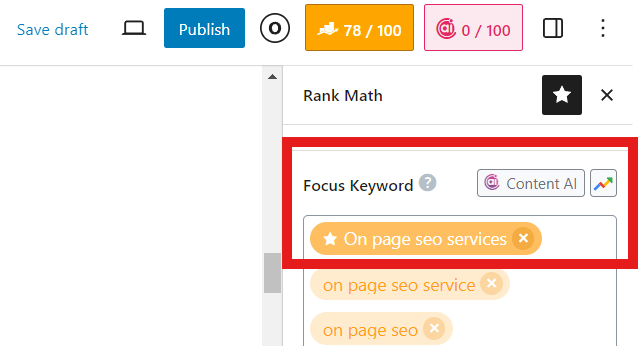
2. SEO Title
Your SEO title should be compelling and include the focus keyword. This is the title that appears on search engine results pages (SERPs) and influences click-through rates. For example, “Effective On Page SEO Services to Boost Your Website Ranking.”
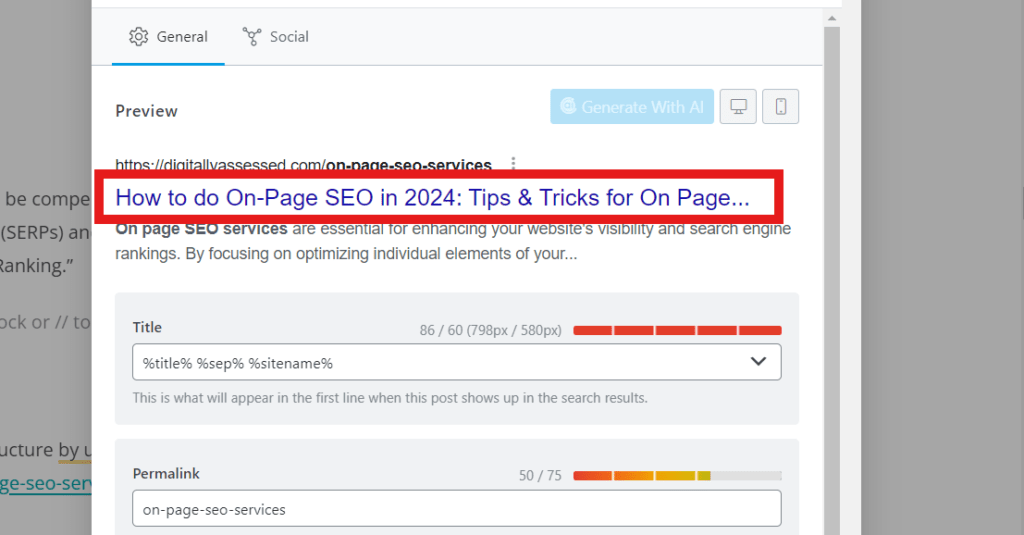
3. Slug Permalink
Optimize the URL structure by using a clear and concise slug that includes the focus keyword. For instance, “digitallyassessed.com/on-page-seo-services” is preferable over a generic or lengthy URL.
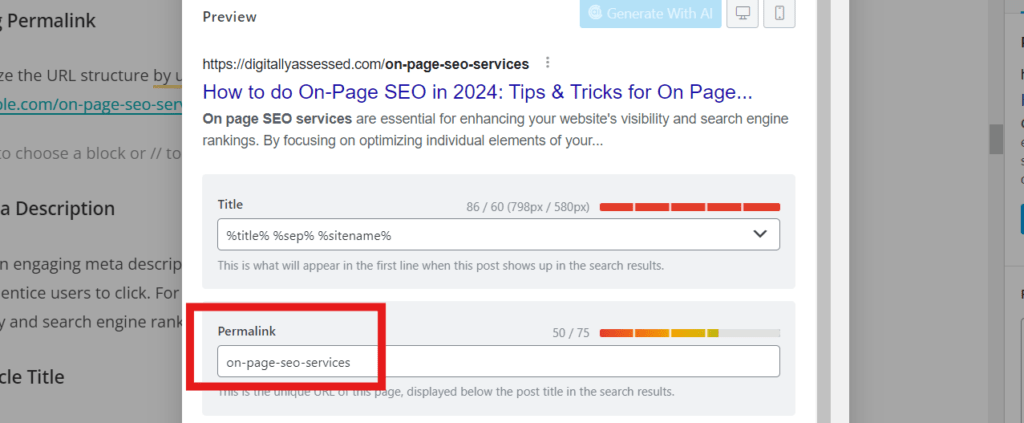
4. Meta Description
Write an engaging meta description that includes the focus keyword. This snippet appears in search results and should entice users to click. For example, “Learn about the best on-page SEO services to enhance your website’s visibility and search engine ranking.”
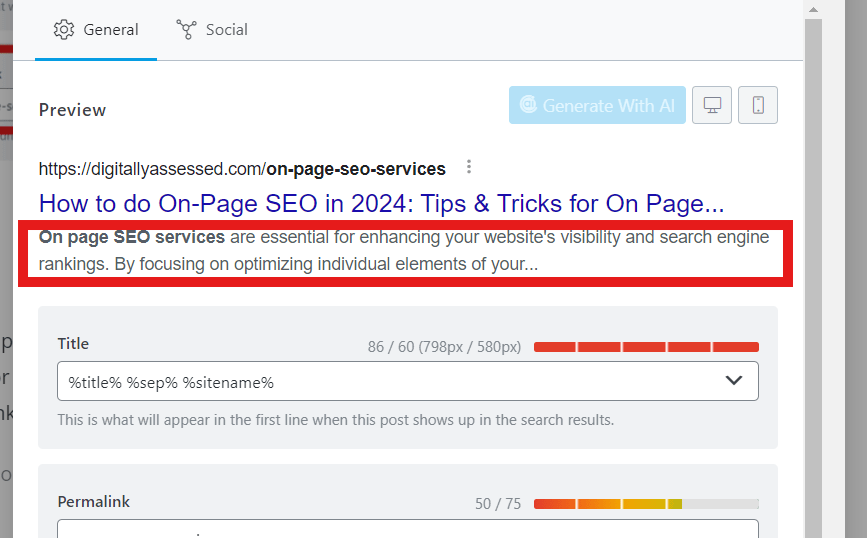
5. Article Title
The main article title should be attention-grabbing and include the focus keyword. This helps with both SEO and user engagement. For example, “15 Essential On Page SEO Services for Optimal Website Performance.”
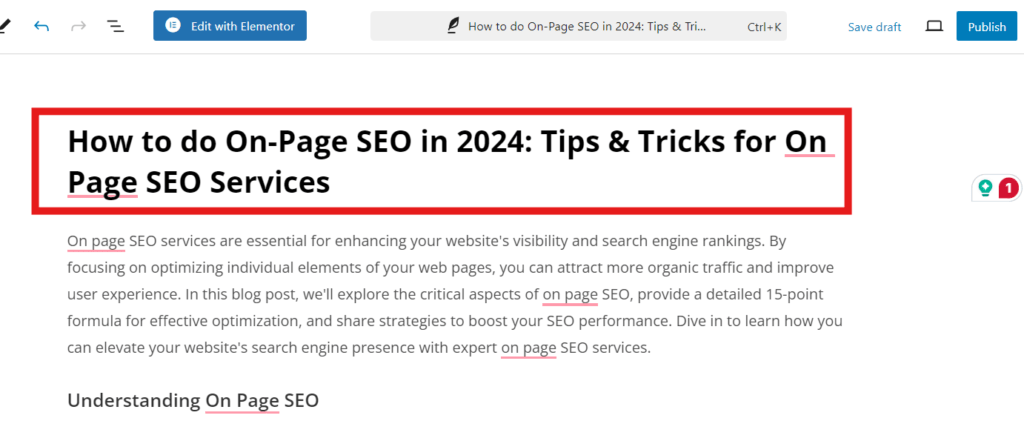
6. Main Keyword in 1st Paragraph
Ensure that the focus keyword appears in the first paragraph of your content. This helps search engines quickly identify the topic of your page.
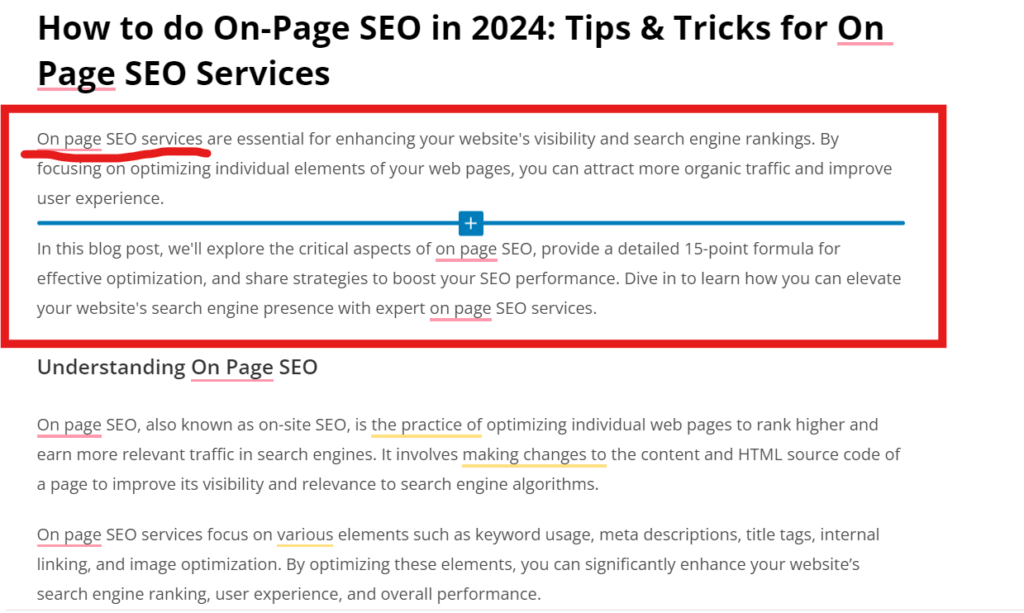
7. Shorter Sentences 3-4 Lines
Keep your sentences short and to the point, ideally 3-4 lines. This enhances readability and keeps readers engaged.
8. SEO Optimized Images
Optimize your images by reducing their size without compromising quality. Use descriptive file names and include alt text that contains relevant keywords like “on page SEO service.”
9. SEO Optimized Featured Image
Choose a high-quality, relevant featured image and optimize it for SEO. Ensure it includes the focus keyword in the alt text.
10. Relevant Internal Links
Link to other relevant pages within your website to improve navigation and keep visitors engaged longer. For example, link to a blog post about “how to boost SEO” within the article.
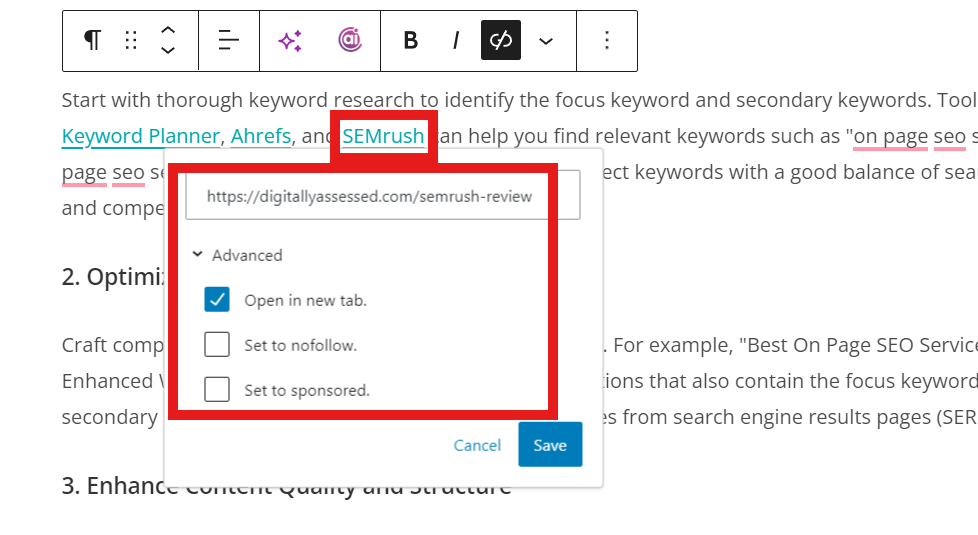
11. At Least 2 Relevant External Links
Include at least two links to authoritative external sources to add credibility to your content. For example, link to reputable websites discussing “search engine optimization services.”
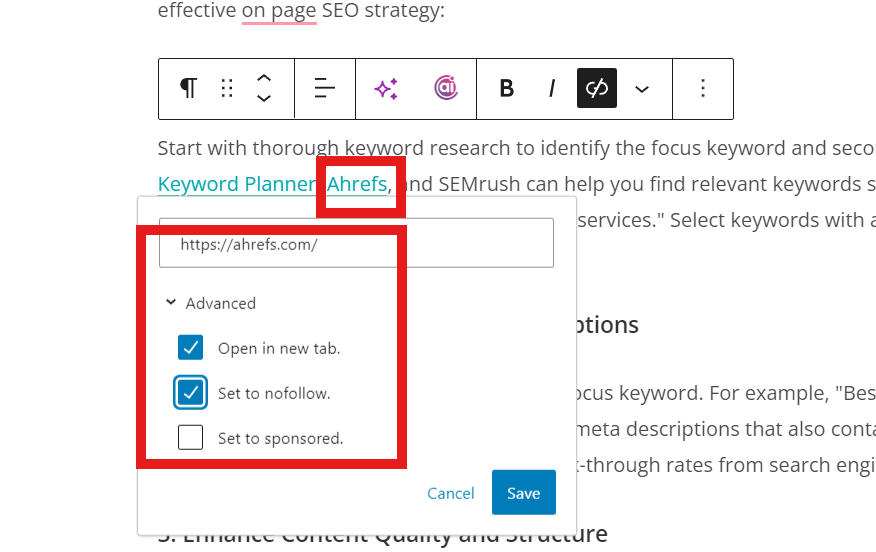
12. 5 – 10 SEO Optimized Images
Use between 5 to 10 images in your content, all optimized for SEO with relevant alt text. These images can illustrate points and break up text for better readability.
13. Min. 3 Headings of H2
Use at least three H2 headings to structure your content. These should include the focus keyword and make the content easier to navigate.
14. Min. 3 Headings of H3
Include at least three H3 headings to further organize your content under the H2 headings. This helps with readability and SEO.
15. Min. 3 Headings of H4
Use at least three H4 headings to break down content under H3 headings. This detailed structuring aids in better comprehension and organization.
By following this 15-point formula for on page SEO services, you can significantly enhance your website’s optimization. This not only improves your search engine rankings but also provides a better user experience, driving more traffic and engagement.
Best On Page SEO Strategy
Implementing the best on page SEO strategy is essential for boosting your website’s visibility and search engine rankings. By focusing on key aspects of on page SEO services, you can create a well-optimized site that attracts more organic traffic and provides a better user experience. Here’s a step-by-step guide to help you develop an effective on page SEO strategy:
1. Keyword Research and Selection
Start with thorough keyword research to identify the focus keyword and secondary keywords. Tools like Google Keyword Planner, Ahrefs, and SEMrush can help you find relevant keywords such as “on page seo services,” “on page seo service,” and “website optimization services.” Select keywords with a good balance of search volume and competition.
2. Optimize Title Tags and Meta Descriptions
Craft compelling title tags that include your focus keyword. For example, “Best On Page SEO Services for Enhanced Website Ranking.” Write engaging meta descriptions that also contain the focus keyword and secondary keywords. This helps improve click-through rates from search engine results pages (SERPs).
3. Enhance Content Quality and Structure
Create high-quality, informative content that addresses the needs and interests of your audience. Use the focus keyword naturally throughout the content, especially in the first paragraph. Organize your content with clear headings (H2, H3, H4) that include relevant keywords to improve readability and SEO.
4. Optimize Images and Multimedia
Images and multimedia elements can enhance user experience and engagement. Ensure all images are optimized for SEO by using descriptive file names and alt text that include keywords like “on page seo service.” Compress image files to reduce load times without compromising quality. Add relevant images to illustrate points and break up text, such as charts or infographics about SEO strategies.
5. Utilize Internal and External Links
Include relevant internal links to other pages on your website. This improves site navigation and helps distribute page authority. For instance, link to articles on “how to boost SEO” or “search engine optimization services.” Additionally, include at least two external links to authoritative sources. This adds credibility to your content and provides additional value to readers.
6. Improve Page Load Speed
Page load speed is a crucial factor for both user experience and SEO. Optimize your website’s performance by minimizing HTTP requests, using browser caching, and compressing files. Tools like Google PageSpeed Insights can help you identify areas for improvement.
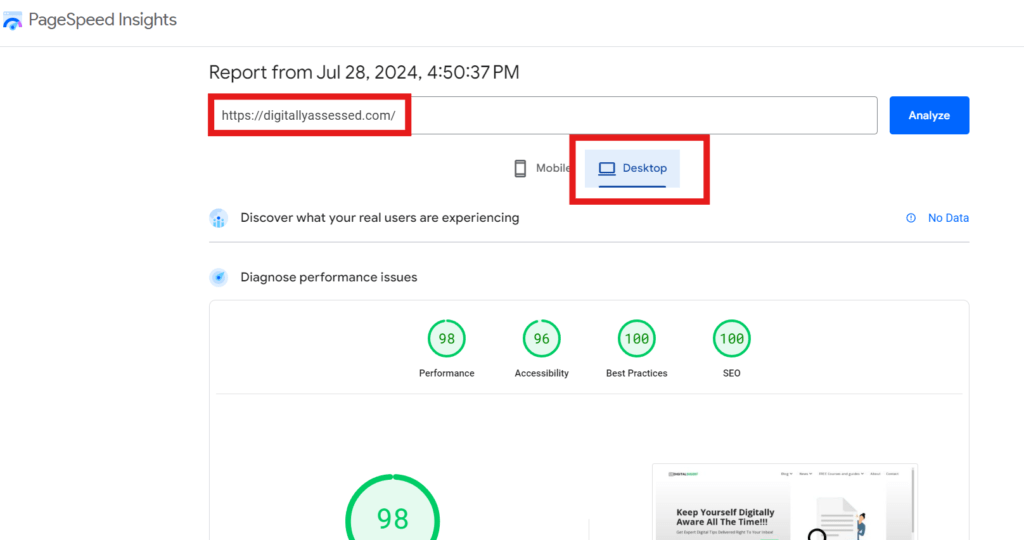
7. Ensure Mobile-Friendliness
With the increasing use of mobile devices, ensuring your website is mobile-friendly is essential. Use responsive design techniques to ensure your site looks and functions well on all devices. Google’s Mobile-Friendly Test can help you verify your site’s mobile compatibility.
8. Use Schema Markup
Implement schema markup to help search engines understand your content better. Schema markup can enhance your search results with rich snippets, improving click-through rates. Use structured data to highlight important information such as reviews, ratings, and product details.
9. Regularly Update and Audit On Page SEO Elements
SEO is an ongoing process. Regularly update your content to keep it relevant and accurate. Conduct periodic SEO audits to identify and fix any issues. Tools like Screaming Frog and SEMrush Site Audit can help you perform comprehensive audits.
By following these steps, you can develop the best on page SEO strategy tailored to your website’s needs. This strategy not only improves your search engine rankings but also enhances user experience, leading to increased traffic and engagement. On page SEO services are a vital component of any successful digital marketing plan, ensuring your site remains competitive and visible in search results.
How to Boost SEO with On Page SEO Services
Boosting your website’s SEO with on page SEO services is a strategic approach to enhance visibility and attract more organic traffic. By focusing on optimizing various on-page elements, you can significantly improve your site’s search engine rankings and user experience. Here’s how you can effectively boost SEO using on page SEO services:
1. Conduct Comprehensive Keyword Research
Start by conducting thorough keyword research to identify the most relevant and high-performing keywords for your website. Use tools like Google Keyword Planner, Ahrefs, and SEMrush to find focus keywords such as “on page seo services” and secondary keywords like “on page seo service” and “search engine optimisation services.” Select keywords with a good balance of search volume and competition.
2. Optimize Title Tags and Meta Descriptions
Title tags and meta descriptions are critical elements for SEO. Create compelling title tags that include your focus keyword. For example, “Effective On Page SEO Services to Boost Your Website Ranking.” Write engaging meta descriptions that also contain the focus keyword and secondary keywords. This improves your click-through rate from search engine results pages (SERPs).
3. Enhance Content Quality and Structure
High-quality, informative content is essential for SEO. Ensure your content is well-researched, relevant, and valuable to your audience. Use the focus keyword naturally throughout the content, especially in the first paragraph. Organize your content with clear headings (H2, H3, H4) that include relevant keywords. This makes your content easier to read and improves SEO.
4. Optimize Images and Multimedia
Images and multimedia elements enhance user experience and engagement. Optimize all images by using descriptive file names and alt text that include keywords like “on page seo service.” Compress image files to reduce load times without compromising quality. Add relevant images to illustrate points and break up text, such as charts or infographics about SEO strategies.
5. Implement Internal and External Links
Use internal links to connect related pages within your website. This improves site navigation and helps distribute page authority. For example, link to articles on “how to boost SEO” or “website optimization services.” Additionally, include at least two external links to authoritative sources. This adds credibility to your content and provides additional value to readers.
6. Improve Page Load Speed
Page load speed is crucial for both user experience and SEO. Optimize your website’s performance by minimizing HTTP requests, using browser caching, and compressing files. Tools like Google PageSpeed Insights can help you identify areas for improvement.
7. Ensure Mobile-Friendliness
With the increasing use of mobile devices, ensuring your website is mobile-friendly is essential. Use responsive design techniques to ensure your site looks and functions well on all devices. Google’s Mobile-Friendly Test can help you verify your site’s mobile compatibility.
8. Use Schema Markup
Implement schema markup to help search engines understand your content better. Schema markup can enhance your search results with rich snippets, improving click-through rates. Use structured data to highlight important information such as reviews, ratings, and product details.
9. Regularly Update Content
Keep your content fresh and relevant by regularly updating it. Search engines favor websites that consistently provide new and updated information. Regularly review and update old content to ensure it remains accurate and valuable to your audience.
10. Conduct Regular SEO Audits
Perform regular SEO audits to identify and fix any issues that may be hindering your website’s performance. Tools like Screaming Frog and SEMrush Site Audit can help you conduct comprehensive audits and uncover areas for improvement.
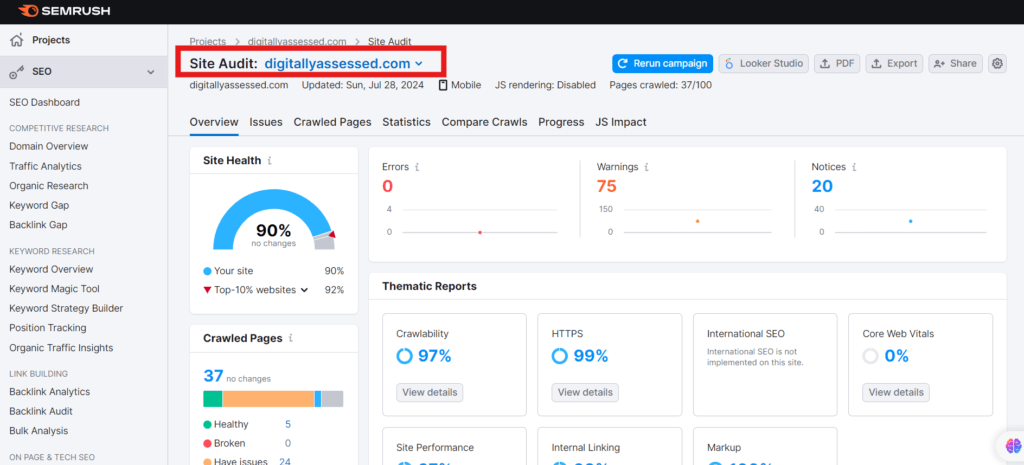
By leveraging these on page SEO services, you can effectively boost your website’s SEO. This approach not only improves your search engine rankings but also enhances the overall user experience, driving more traffic and engagement. Investing in professional on page SEO services is a smart strategy for long-term online success, ensuring your website remains competitive and visible in search results.
Conclusion
Incorporating effective on page SEO services is essential for boosting your website’s visibility and search engine rankings. By understanding and implementing key strategies such as comprehensive keyword research, optimizing title tags and meta descriptions, enhancing content quality, and improving page load speed, you can significantly enhance your site’s performance.
Optimizing images, utilizing internal and external links, ensuring mobile-friendliness, and using schema markup are additional steps that contribute to a well-rounded on page SEO strategy. Regularly updating content and conducting SEO audits further ensure that your website stays relevant and competitive.
By following the outlined strategies and leveraging professional on page SEO services, you can achieve higher search engine rankings, attract more organic traffic, and provide a better user experience. Start implementing these tactics today to boost your SEO and drive long-term success for your website.
Summary Table
| # | 15-Point Formula Title | Description |
|---|---|---|
| 1 | Focus Keyword | Use “on-page SEO services” strategically throughout the content. |
| 2 | SEO Title | Create a compelling title that includes the focus keyword. |
| 3 | Slug Permalink | Use “on-page seo services” strategically throughout the content. |
| 4 | Meta Description | Write an engaging meta description with the focus keyword. |
| 5 | Article Title | Craft an attention-grabbing title that includes the focus keyword. |
| 6 | Main Keyword in 1st Paragraph | Ensure the focus keyword appears in the first paragraph. |
| 7 | Shorter Sentences 3-4 Lines | Keep sentences concise for better readability and engagement. |
| 8 | SEO Optimized Images | Optimize image size, name, and alt text for better SEO. |
| 9 | SEO Optimized Featured Image | Use a high-quality, relevant featured image with the focus keyword in the Alt text. |
| 10 | Relevant Internal Links | Link to relevant content within your website to improve navigation. |
| 11 | At Least 2 Relevant External Links | Include links to authoritative external sources for credibility. |
| 12 | 5 – 10 SEO Optimized Images | Use multiple optimized images to enhance content and readability. |
| 13 | Min. 3 Headings of H2 | Use at least three H2 headings for clear content structure. |
| 14 | Min. 3 Headings of H3 | Include at least three H3 headings to further organize content. |
| 15 | Min. 3 Headings of H4 | Use at least three H4 headings for detailed content breakdown. |
This table provides a quick overview of the 15 essential points for effective on-page SEO, ensuring each element is optimized to enhance your website’s search engine performance and user experience.

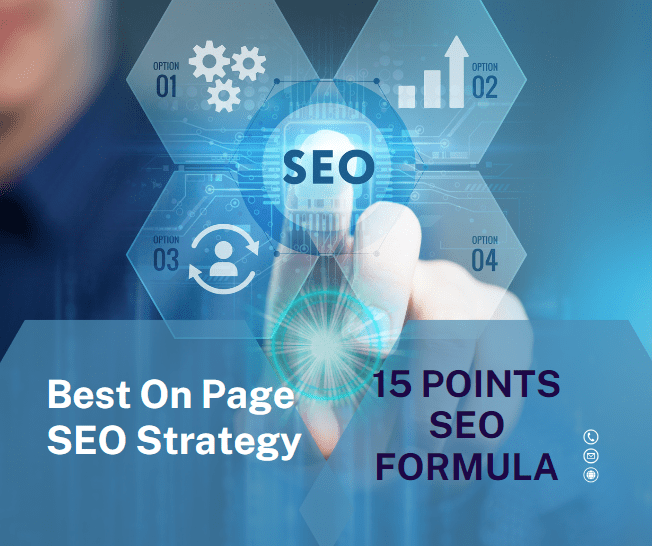
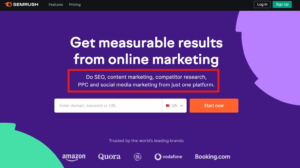


Pingback: Google Keyword Planner In-Depth Review 2024: Key Features, Setup, and Advanced Strategies - Digital Digest